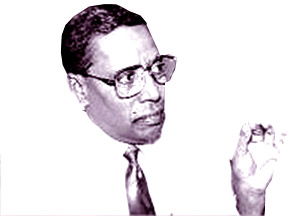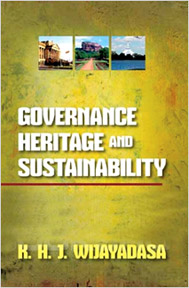|
K.H.J. Wijedasa's Governance, Heritage and
Sustainability:
Life, Flux And Inspiration
Reviewed by Prof. K.N.O. Dharmadasa
|

K.H.J. Wijedasa
|
As the title of the book would reveal this book covers a wide range
of concerns applicable to Sri Lanka of today. Governance and
sustainability are topics which are applicable to any country. But Sri
Lanka, like many countries in South Asia has a long standing cultural
heritage which also has to be kept in view when dealing with the
subjects governance and sustainability. This is a complex book which
covers many aspects of the Sri Lankan society which are directly
relevant to the topics of concern. In this review therefore I would like
to deal only with some aspects of the presentations made by the author
in relation to Sri Lankan culture.
Governance has been defined as "the manner in which power is
exercised in the management of a country's economic and social
resources"(p.7). We should keep in mind at the outset, that we are
dealing here with a democratic society. One could argue that governance
as defined could be pursued very efficiently under a totalitarian
set-up. But the very principle of good governance as we know it has as
its base a democratic foundation.
Under a totalitarian regime we can have a highly efficient management
of a country's economic and social resources where the transport system
runs smoothly, the health care system is magnificent and the schools are
managed beautifully and so on. Sustainability too is taken care of and
there is concern for both the present as well as for the future. With
all these achievements however, there will be something lacking in the
spirit of the people. That is because the principles of accountability,
transparency, equity, fair play and other aspects of the rule of law are
not adhered to and people will therefore not be happy. Those principles
of good governance, we can say, are rooted in the human condition. Man
is not a heartless machine which will go on functioning as long as there
is the supply of energy for it to carry on.
Freedom to question
The human being is by nature a thinking creature and will feel
incomplete if he does not have the freedom to question, to think of new
things, to try out different ways of doing things and so on. While a
totalitarian society can give enough to eat, good clothes to wear, good
housing etc. it will be curtailing the free spirit of man and therefore
all its achievements will be of no avail as people will not be happy.
That is why good governance is by definition a functioning within a
democratic system of government.
 The emotional and spiritual aspect of the human condition is very
relevant when we deal with a traditional society such as Sri Lanka which
has a long standing cultural heritage. I am reminded here of a phrase
used by our great writer Martin Wickramasinghe. Speaking of the essence
of Sinhala culture he says that Buddhism has bestowed on us ‘a charter
of freedom’. The Sinhala word he uses is nidahas sasun pata. In his view
the unique features of our culture are rooted in that spirit of freedom
which we have derived from Buddhism. The emotional and spiritual aspect of the human condition is very
relevant when we deal with a traditional society such as Sri Lanka which
has a long standing cultural heritage. I am reminded here of a phrase
used by our great writer Martin Wickramasinghe. Speaking of the essence
of Sinhala culture he says that Buddhism has bestowed on us ‘a charter
of freedom’. The Sinhala word he uses is nidahas sasun pata. In his view
the unique features of our culture are rooted in that spirit of freedom
which we have derived from Buddhism.
We all agree that historically what we can call the Sri Lankan
culture in essence is a Buddhist culture which arose in this island and
which continued to develop in this soil for over two millennia. All our
achievements in art and architecture, painting literature, music and so
on are basically Buddhist in form and content. Furthermore, the
intangible aspects of our culture like our customs and rituals and our
thought processes are all rooted in Buddhism in one way or the other.
Speaking of the special identity of Sinhalese art Wickramasinghe says
that the simplistic charm, the lack of over-ornamentation and the
harmony with nature found in our sculpture and painting are features
directly derived from Buddhist teachings.
He often uses the word Apis bava derived from the Pali word alpechcha
(‘few wants’) is a word he has often used to describe the austere nature
of Buddhist livelihood in ancient times which was the direct opposite of
conspicuous consumption, the hallmark of the consumer society of today.
Happy society
Mr. Wijedasa, in part two of his book, deals with Heritage as it
applies to the concerns of Governance and Sustainability. He has argued
very cogently how the Buddhist way of life leads to a happy society in
which sustainable development as we know it is also accomplished. One of
the author's insights is that Buddhism which does not believe in a
creator and an almighty God has in the theory of anatta (absence of a
soul and impermanence) an ideally suitable basis for the practice of
sustainable development.
The doctrine of anatta teaches that all worldly phenomena are
impermanent: that they arise and pass away one can see the potential for
a developmental strategy which is harmonized with the changing
environment where man, animal and plants as all living organisms can
live and let live.
The author has also pointed out that the Buddha in his personal life
preferred to live very close to the natural environment. He was born in
a park under a Sala tree. He attained enlightenment under a Bodhi tree
and during his life-time travelling and preaching the doctrine stayed
very often in parks such as Veluvana (bamboo grove) Ambavana (Mango
grove) etc. and he finally, passed away in the Sala Vana (the Sala
grove) at Kusinara. He admonished his disciples to seek natural environs
like forests and shades of trees (aranna, rukkhamula) when practicing
meditation. That was an ideal life which was living in harmony with
nature.
As far as lay life is concerned, the Buddha has recognized the
pursuit of four types of happiness, namely, Attha Sukha (material
happiness) Bhoga Sukha (sensual pleasures) Ananu Sukha (not being
indebted, pleasure of independence) and Anavajja Sukha (pleasure of
being without blame). As the author points out the Buddha has taught us
that such a wholesome life is possible if we follow the Noble Eightfold
Path. Here, the author points out that Samma Ajiva which is the most
crucial aspect of a layman's life means a harmless occupation which will
be morally uplifting for the individual concerned as well as be without
moral or physical harm to others. (p.120).
When we speak of Samma Ajiva what Mr. Wjedasa has included in the
section on the Hydraulic Civilization of Sri Lanka is directly relevant.
In that civilization people lived in harmony with nature. We were a rice
producing nation and our livelihood fitted perfectly the Buddha's
teachings which we followed. Mr. Wijedasa points out that Buddhism
teaches us the basic concepts of sustainable living as reflected in the
famous dictum Santhutthi Paranam Dhanam meaning contentment is the
highest gain. Also, Buddhist teaching emphasizes the moral values of
frugality and resourcefulness and the consequences of excessive craving
and conspicuous consumption (p.101)
I would like to add something here. What Mr. Wijedasa says is what
Martin Wickramasinghe saw in apis bava, being happy with a few wants.
Valuable suggestions
As I stated earlier this is a complex book. The author has many
insights into the present day problems of development and
sustainability.
He also has many valuable suggestions on how to overcome these
problems and as my review deals with only one aspect of the work I am
recommending it to those who are interested in those wider issues. As
for the cultural heritage on which he has devoted a considerable section
of the book there are some beautiful passages where he deals with the
situation as it was in ancient times.
Let me quote one of them where he points out the harmonious blending
of all natural phenomena including man.
Sri Lanka's biological diversity has maintained human society for
countless centuries in myriad ways. Forests, grasslands, wetlands and
coastal and marine habitats and the species they support have provided
fuel wood, timber, fish, medicinal herbs food and animals for
domestication. Forests have helped to regulate the climate, recycle
plant nutrients, protect the soil and water, control pests and disease,
and provide habitats and breeding grounds essential for fish and wild
life that enable human survival" (pp. 99-100)
After all we are concerned primarily with human survival. But the
environment including plant and animal life as well as the natural
resources like water are all part and parcel of a structural whole which
has to be kept in balance if human beings are to survive.
Our forefathers have shown that it is possible to attain development
while sustaining that balance. I think this is the message we can get
from Mr. Wijedasa's book. |







